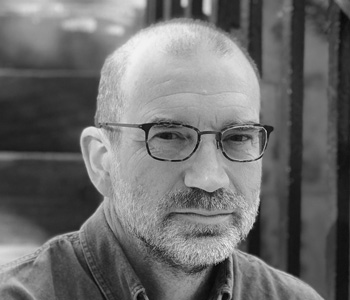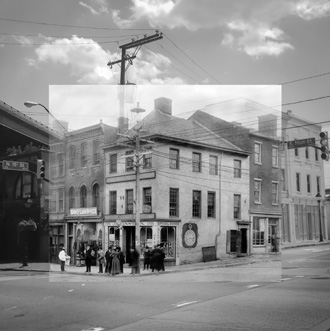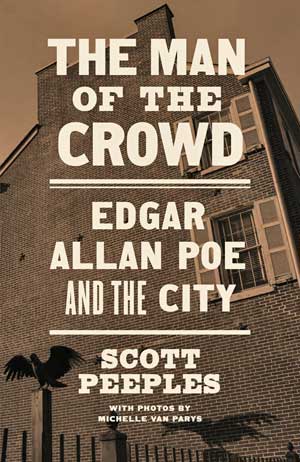
The Man of the Crowd is a biography of Edgar Allan Poe that focuses on the four American cities—Richmond, Baltimore, Philadelphia, and New York—where he made his career as a writer and editor. Poe lived in a time of rapid urbanization, and I contend that his life and work are best understood in terms of that development, and in terms of what was happening in these particular cities in the 1830s and 1840s.
The book chronicles Poe’s entire life, but I arrange his story into chapters corresponding with specific cities. In the first chapter, I highlight, among other things, the fact that Richmond was a center of the domestic slave trade; Poe grew up and later worked within blocks of auction houses, jails, and hotels that provided the infrastructure for that trade. I speculate that some of the physical cruelty and sadism that shows up in Poe’s later fiction might have been inspired by the dehumanizing practices associated with slave auctions.
In the chapter that centers on Baltimore, we see Poe experiencing real poverty as a man in his early 20s. There he began writing fiction for magazines—not a very reliable way to make a living, but it was what he would do for the rest of his life. He also found a family with his aunt Maria Clemm and her daughter Virginia, whom he would soon marry.
In the third chapter, on Philadelphia, I describe Poe hitting his stride as a fiction writer. Philadelphia was a city whose image depended on orderliness and Quaker probity, but urban squalor was barely hidden behind grand façades, and mob violence was a constant threat. I trace that contradiction through discussions of some of Poe’s lesser-known satires as well as “The Murders in the Rue Morgue” and the proto-detective story “The Man of the Crowd”, which gives my book its title.
Poe moved to New York in 1844 to be at the center of American publishing, and much of his writing during his years in Manhattan comment on the world of magazines, literary reputations, and the terms of success and failure. Poe even wrote a series of gossipy personality profiles called “The Literati of New York City”, while fomenting scandal and rivalry with the Boston literary establishment.
The final chapter is titled “In Transit”—though still ostensibly living in New York (specifically, in what would become the Bronx), Poe spent about half of this period traveling, visiting Philadelphia and Richmond before his life ended tragically and mysteriously in Baltimore.
Throughout the book, I stress the influence not just of these cities but of the city as a phenomenon of the early nineteenth century, and I see Poe, for all his genius, as a man who, like many others, saw opportunity in rapidly growing urban centers but more often than not found frustration and disappointment.
At an American Literature conference about eight years ago, I presented a paper with the title “No Place Like Home”, which proposed that what the field of Poe biography had overlooked was the fact of Poe’s itinerancy. Poe changed addresses on average about once a year throughout his life. It’s not that we didn’t know this, but I don’t think Poe scholars or biographers had really thought much about what it means—how moving from house to house, city to city, might be a defining feature of his life. When I wrote that paper, I felt like I had the beginning of a new kind of Poe biography. “No Place Like Home” became the title of the book’s introduction, and the idea of being on the move became a strong motif alongside the central idea of the city.
The concept of place as explored by humanistic geographers has inspired a lot of work in literary studies over the past ten or twenty years. That scholarship usually involves questions about how meaning is constructed through place, both in literary works with a strong sense of location and in the lives of writers. Poe scholars have approached “place” in a variety of ways—fictional, symbolic places like the House of Usher or the torture chamber of “The Pit and Pendulum”, but also the question of Poe’s own sense of place and what it might mean for his fiction and poetry. This new wave of interest in place culminated in a collection of essays entitled Poe and Place, edited by Philip Phillips and published in 2018. I contributed an essay to that volume that in some ways previewed The Man of the Crowd; a discussion of Poe as a man on the move, and the difficulties of associating him too closely with any single place.
More broadly, I believe most Poe scholars see themselves as myth debunkers, because in popular culture Poe tends to be seen as a man who lived in a world of his own imagination, either on drugs or just intoxicated by his own misery and creativity. But there’s a lot of scholarship that emphasizes the various ways Poe was engaged with the social problems, the politics, the economics of the antebellum U.S., and I’ve drawn heavily on that scholarship in The Man of the Crowd. The book isn’t really a study in genius but more of a reality tour of Poe’s America.
The book is illustrated with original photographs of “Poe places” by Michelle Van Parys; it also contains a number of archival images, including contemporary maps of the cities where Poe lived. I would hope that a browsing reader would first just flip through the book and look at some of those photographs, which are an important feature of the project, along with the maps and other archival items. A few of Michelle’s photographs are “blended” with archival images to create a sort of then-and-now effect, which I really like.
But in terms of the text, I think the beginning of Chapter Three, which covers Poe’s years in Philadelphia, is a good sample of what the book is like. The first pages are about life in Philadelphia in the years after the Panic of 1837, with some quotations from contemporary observers like Charles Dickens. I also discuss Poe’s motivation for moving there, and where he settled together with Virginia and Maria Clemm. They found a house near Rittenhouse Square, a part of town that was only sparsely developed at the time. And of course, that’s why Poe could afford to live in that area—it hadn’t become fashionable yet.
This part of the chapter moves along quickly, as Poe lands a job at Burton’s Gentleman’s Magazine, and I’m then able to describe some of the people he got to know in connection with that job as well as the significance of magazines in American life in the mid-nineteenth century. About ten pages into the chapter, I discuss some of the satires Poe wrote in the late 1830s: “How to Write a Blackwood Article”, “Peter Pendulum, the Business-Man”, and “The Man That Was Used Up”; some lesser-known stories that I think reflect his skepticism toward the world of business and politics that he was becoming acquainted with in Philadelphia.

I wrote in the book’s introduction that this is not a work of academic literary criticism (my background) but that I wanted to write primarily for a non-specialist audience with this project. So when I did discuss specific works by Poe, I could hear the clock ticking, if you know what I mean. I wanted to make these stories more interesting to readers than they would be if you just picked them up without knowing anything about the context. But even when I discussed the title story, “The Man of the Crowd”, I kept it to about three and a half pages. I just tried to be selective in the analysis, keeping the book’s focus and my “ideal” reader in mind.
At the same time, I didn’t want to leave significant gaps in the biographical record—I tried to tell a good, true story. If I succeeded, the book works both as an introduction to Edgar Allan Poe and his life for people who are casually acquainted with him and as a book that’s making an argument—that Poe’s career is inseparable from the development of the American city. I hope readers will recalibrate their image of Poe as they read the book and understand him as a writer who was very much engaged with his surroundings, and who struggled to succeed in a rapidly changing world.


Scott Peeples is Professor of English at the College of Charleston, where he teaches courses in nineteenth-century American literature, Gothicism, and writing. The Man of the Crowd is his third book on Edgar Allan Poe; he also co-edited, with J. Gerald Kennedy, The Oxford Handbook of Edgar Allan Poe (2019). His essays on American literature have appeared in a wide range of publications, including Southern Cultures, J19, ESQ, Leviathan, and Salon.